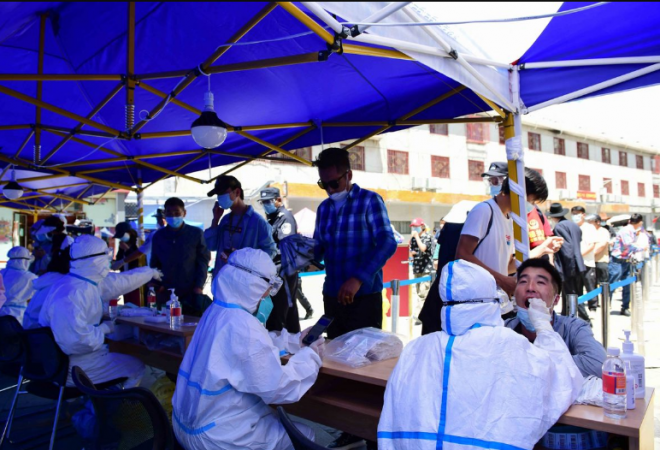
Tibet: This month, more than 100 Tibetan officials have been fired or warned for failing to stop the spread of COVID-19.
Until the outbreak was first reported in several Tibetan cities on 8 August, the remote Himalayan region had experienced only one imported case from central Hubei province since January 2020.
Of the nearly 1,300 new Covid-19 infections reported across the country on Saturday, nearly 500 occurred in Tibet; Other major hotspots were the neighboring region of Xinjiang and the southern island of Hainan.
Under China's strict zero-Covid policy, which aims to quickly end local flare-ups with snap lockdowns, mass testing, extensive contact tracing and quarantines, the caseload may appear insignificant compared to other countries, But such numbers are considered major outbreaks.
According to a report by the state-backed Tibet Daily, 22 officials in the regional capital Lhasa faced disciplinary action last week alone for negligence in coronavirus control.
According to the newspaper, which cited local officials, five of them were fired and the rest received serious warnings.
The Party Discipline Commission took action against six officials in Hainan, a famous tropical getaway where a sudden lockdown and cancellation of trains and flights earlier this month left thousands of tourists stranded.
Among them was Gu Hao, a party leader from Sanya's Jiang district and a seaside resort town leader, who was fired on August 16.
Sanya, famous for its white sand beaches, five-star hotels and duty-free shopping, turned into a nightmare for 80,000 tourists stranded in its hotels when authorities suddenly imposed a lockdown on August 6 to contain an outbreak , which had spiraled out. control.
Officials were punished for their "lack of political status," "inadequate implementation of epidemic prevention and control work," and "grave bureaucracy, formality, ineffective performance of duties [and] neglect of duty", both of which are part of Tibet. According to official statements and Hainan.
Despite the recent easing of entry requirements, according to Alfred Wu, associate professor at the Lee Kuan Yew School of Public Policy at the National University of Singapore, China's drastic measures suggest zero-Covid is yet to come before this year's party congress. is also the top political priority of the country.
Along with the traditionally significant leadership reshuffle, President Xi Jinping is expected to begin an unprecedented third term in office during this iteration of the Five-Year Congress.
"The harsh punishment serves as a strong reminder to the local Chinese authorities of what is currently the most important matter. The reopening of China's borders to foreign students and businessmen [represents] only a technological or strategic change. According to Wu "Zero-Covid still the most important, non-negotiable job domestically.
As it demonstrates his commitment to zero-Covid, imposing severe punishment is another way for provincial or regional party chiefs to show their allegiance to Xi.
Hong Kong lawmakers give bonuses to staff after the Legco term began
NATO's concerns over China are highlighted by French and German air force missions in the Pacific